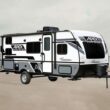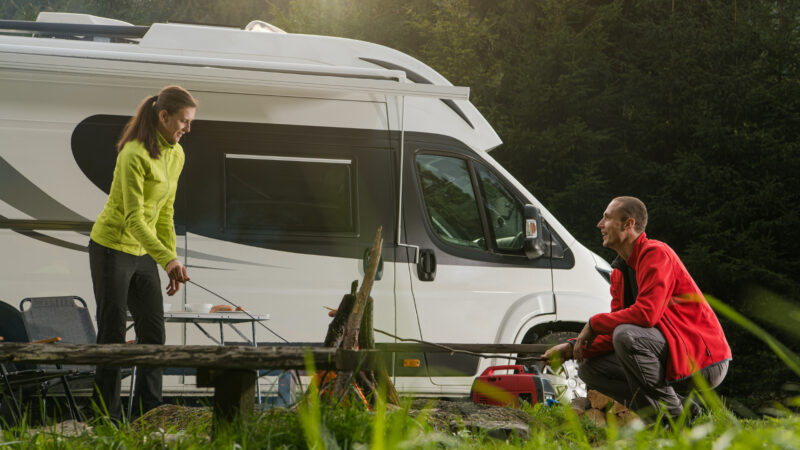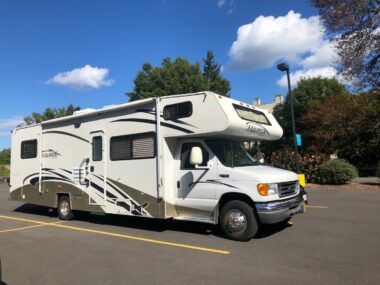Table of Contents Show
We love sharing RV tips we’ve picked up during our travels. The more you RV, the easier it is to discover hacks that make RVing easier. Whether you’re RVing full time or on the weekends, saving time, energy, and money is easy to enjoy. Today, we’re sharing some RV tips we think every camper should know. Let’s get started!
How Can I Make My RV Life Easier?
RV life has many repetitive tasks that you need to do each time you use your RV. Some of these tasks increase our comfort, and others are essential for your safety. Making RV life easier means being as efficient as possible with your time and energy during these tasks to spend more time doing the activities you enjoy most.
Making the most out of every minute while RVing is essential to maximizing your RV life experiences. While not every task will be enjoyable, getting them done and out of the way allows you to get back to the more enjoyable parts of RV life.
What Are Some RV Must Haves?
Some of the best must-have items make RV life easier by protecting your RV, keeping you safe, and allowing you to be as comfortable as possible. Some of the must-have items we often recommend to RVers are surge protectors, weather radios, and water pressure regulators.
After you’ve been RVing for a bit, your must-have needs are likely to change. You’re likely to gather the essentials when starting your adventures, but must-have items slowly become more about comfort. A high-quality camping chair, cell phone booster, and campsite decorations become must-have items for many RVers.
You’re likely to find there’s no shortage when it comes to RVing gear that you’re going to want. You can have a never-ending list of must-have items for your RV adventures and maybe even some RV tips of your own.
RV Tips Every Camper Should Know
When we first hit the road, we knew absolutely nothing about RVing. We were reading every blog, watching every video, and trying to learn as much as we could to safely and comfortably enjoy RV life. After traveling thousands of miles in our RVs over the past few years, these are some RV tips we think every camper should know!
1. Have a Departure and Arrival Checklist
It’s easy to get in a hurry or to accidentally overlook a step during your departure or arrival at a campsite. Some steps are more important, but skipping others can damage your RV or cause an injury. We’ve created some checklists that we use during our RV adventures. No matter how long you’ve been RVing, mistakes happen. Following these checklists help us avoid any costly mistakes that could prevent us from enjoying our RV adventures.
2. Know the Height and Length of Your RV
Did you know the measurements listed on a manufacturer’s website may not be 100% accurate? Sometimes these dimensions don’t include items like air conditioners or ladders added onto your RV. These additions can add several inches to your height or length. While a few inches may not seem like much, they can mean the difference between damaging your RV and squeezing through a tight spot.
When it comes to your RV’s height, make sure to measure from the highest point of your RV after hitching up your rig to your vehicle. This allows you to know the height of your RV as it travels down the highway and helps you plan your route to avoid any low clearances.
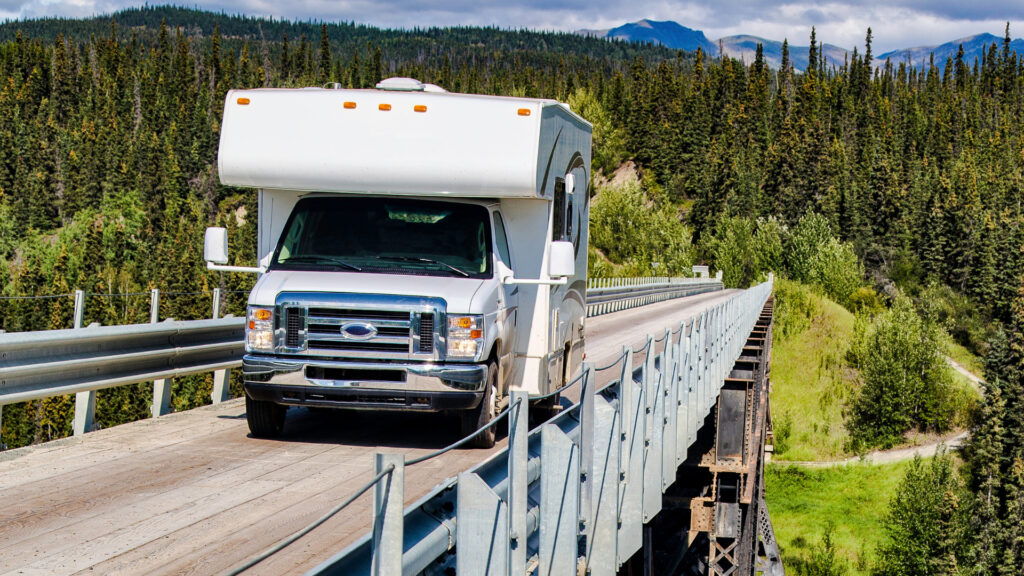
3. Always Look Up
Looking up is an essential part of safely towing an RV. You’re looking for low-hanging tree branches, bridges, and any other low-clearances that could cause issues. It’s easy to underestimate the height of items as you’re driving. However, these items can do thousands of dollars in damage to your RV’s roof. Even minor impacts with a foreign object can result in you needing to replace the entire roof of your RV.
4. Campground Etiquette
This is one of the most important RV tips. When you fail to follow campground etiquette, you’re ruining the camping experience for others. Speeding through the campground, walking through other campsites, and not picking up after pets are all major faux pas. You also don’t want to be known as the noisy neighbors who play their music too loud or are loud after quiet hours.
You must be considerate of your fellow campers. It’s fine to enjoy yourself while camping, but don’t let your enjoyment cause issues for those around you. Failure to follow simple campground etiquette may result in the campground staff asking you to leave.
No matter where you’re camping, you’re likely not going to be the last person to use that space. Follow no trace practices anytime you’re camping and take everything with you when you leave, including trash. Leave a campsite in better condition than you found it, and there’s a good chance it’ll be available for other campers for years to come.
Pro Tip: If you’re not sure about what the campground rules are, check out these campground rules you should never break according to campground owners!
5. Make Adjustments to Conserve Water and Energy
Making a minor adjustment like changing your shower head can significantly impact your RV comfort. Upgrading to an Oxygenics showerhead makes it easy to conserve water but maximize your water pressure.
Many RVers also will upgrade their lighting to LEDs. These lights produce much more light and use less energy. Conserving water and energy can allow you to use your RV in some incredibly remote locations.
6. Carry Extra Hoses, Extension Cords, and Dog Bone Adapters
As one of the more practical RV tips, this gives you the basics of what you need at a campsite. RVing will teach you to plan for the unexpected, especially regarding hoses, cords, and dog-bone adapters. When you travel from campsite to campsite, the distances from the water source and power supply are constantly changing. You’ll also quickly learn that a campground’s power can be inconsistent at best sometimes.
Having a variety of hoses, cords, and dog bones allows you to adapt as necessary, depending on your needs. If a campsite’s 50-amp connection isn’t working, you can grab a dog bone adapter and adjust. This can allow you to have power while the campground sorts out the issue with the power pedestal.
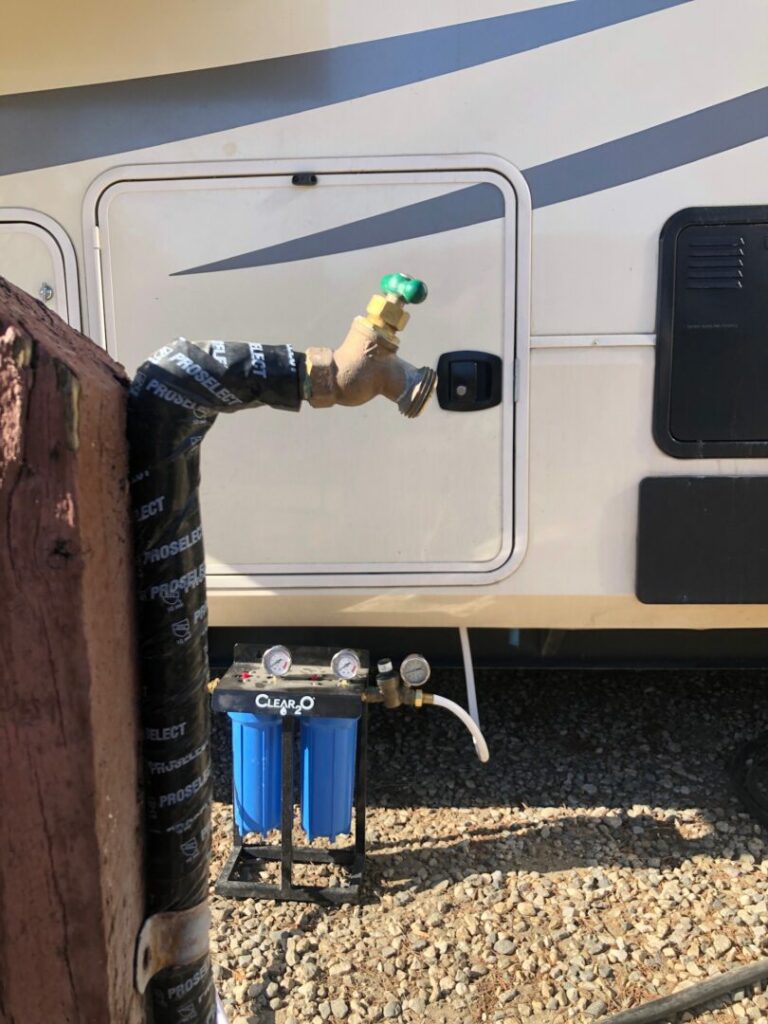
7. Make Friends via Groups and Apps
One of the most fun RV tips, this helps to bring the RV community together, which is a major benefit to RV life. There are a variety of apps and online communities that can allow you to connect with other like-minded travelers. Whether you’re looking to meet new people or stay connected to the ones you’ve already met along the way, technology makes it easy.
Some apps like Nomad Near Me allow you to follow your friends’ adventures on a map or notify you when you and a friend are nearby. This enables you to have unexpected meetups with friends you didn’t know were in the area.
Pro Tip: While RV groups can create an amazing sense of community, are RV Facebook groups doing you more harm than good?
8. Make Driving Days a Breeze With a Trip Planning App
You don’t want to hit the road without this RV tip when you’re traveling in an RV. Using a trip planning app allows you to plan out stops, find places to stay, and be as efficient as possible with your route. Many trip planning resources will even help ensure you’re traveling on RV-safe routes. This can allow you to avoid low clearances or other roads that aren’t safe for towing.
9. Turn Off Your Propane on Travel Days
Turning off your propane during travel days can help you avoid a dangerous situation. If you’re involved in an accident while traveling and your propane is on, a broken propane line can create a dire situation. Propane is a highly flammable gas that can ignite and cause an explosion. Even a minor accident can become a significant situation when you involve propane.
Depending on the length of your travel day, your refrigerator will likely keep your food cool. Some refrigerators will even switch over and run off the battery and not need propane while traveling. It only takes a few seconds to turn your propane on and off; the slight inconvenience is worth it for maximum safety.
Pro Tip: If you’re still not convinced, click here for the full breakdown on why you should travel with your RV propane tanks closed.
10. Prevent Tire Blowouts with a TPMS
A tire pressure monitoring system (TPMS) allows you to keep an eye on your tires while you’re traveling. You can reduce your chances of experiencing a blowout by keeping your tires at the proper levels. If you’re using a TPMS, it can alert you the instant it detects a leak or increased temperature.
A TPMS will also alert you within seconds of experiencing a tire failure. This can help minimize damage to your RV and reduce the chances of escalating the situation. A TPMS is essential for RVing that every RV owner should own and use when towing.
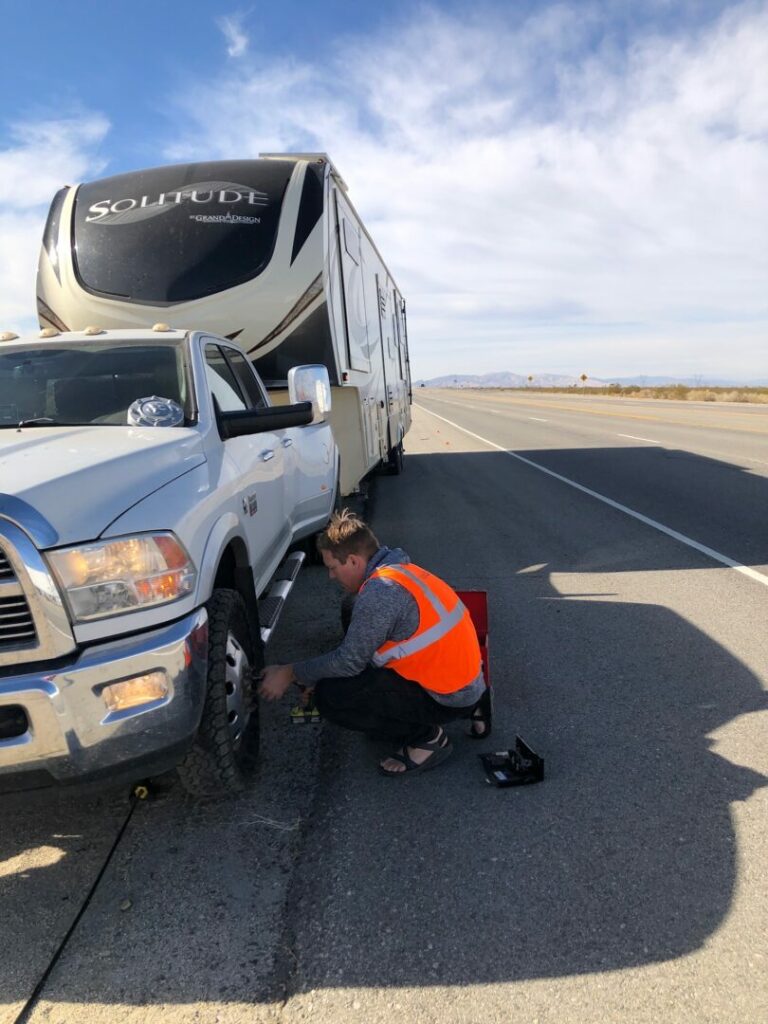
What Should New RV Owners Know?
It’s easy to be in a hurry while RVing. However, taking it slow is the best way to avoid any potential issues that could ruin your adventures. Many RVers follow the 2/2/2 rule to help avoid burnout from moving too quickly or frequently. This rule means driving no more than two hours, stopping every two hours, and being at your destination by 2:00 p.m.
You can make some major mistakes when you’re in a hurry. Some of the biggest mistakes we’ve made were a direct result of rushing. Take your time and avoid making a costly mistake.
These RV Tips Will Get You Road Ready
When you follow the RV tips we’ve shared, you’ll be ready to hit the road. Take it slow and enjoy the adventures. Put in the effort to prepare for each adventure by researching your route and having the necessary gear. This can allow you to make the most out of your experiences and enjoy RV life to the fullest. What RV tips do you think every RVer should know?

